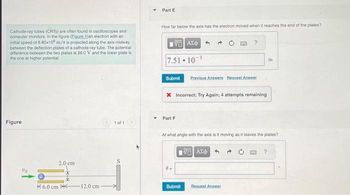Question

Transcribed Image Text:Cathode-ray tubes (CRTS) are often found in oscilloscopes and
computer monitors. In the figure (Eigure 1)an electron with an
initial speed of 6.80x108 m/s is projected along the axis midway
between the deflection plates of a cathode-ray tube. The potential
difference between the two plates is 26.0 V and the lower plate is
the one at higher potential.
Figure
Vo
K6.0 cm
2.0 cm
12.0 cm
1 of 1
Y
Part E
How far below the axis has the electron moved when it reaches the end of the plates?
1951 ΑΣΦ
7.51-10-³
Submit Previous Answers Request Answer
X Incorrect; Try Again; 4 attempts remaining
Part F
At what angle with the axis is it moving as it leaves the plates?
0-
Submit
Η ΑΣΦ 4
m
Request Answer
Expert Solution
This question has been solved!
Explore an expertly crafted, step-by-step solution for a thorough understanding of key concepts.
This is a popular solution
Trending nowThis is a popular solution!
Step by stepSolved in 3 steps with 6 images

Knowledge Booster
Similar questions
- An electron placed midway between two parallel conducting plates that are spaced 4mm apart. The plates are attached to a 550 V power source. What is the electric potential of the electron midway? And what is the maximum velocity if the electron starts at rest at the negative plates?arrow_forwardTwo plates are lying horizontally, but stacked with one 10.0 cm above the other. If the upper plate is held at +100 V, what is the magnitude and direction of the electric field between the plates if the lower is held at +50.0 V? -50.0 V? a. 500 V/m, 1500 V/m, down b. 500 V/m, 1500 V/m, up c. 1500 V/m, 500 V/m, down d. 1500 V/m, 500 V/m, uparrow_forwardA 2.0 cm x 2.0 cm parallel-plate capacitor has a 1.0 mm spacing. The electric field strength inside the capacitor is 1.5×105 V/m. Potential difference across the capacitor =150 volts How much charge is on each plate?arrow_forward
- Help mearrow_forwardParticle A has a charge of 10uC and a mass of 0.001kg. Particle A starts out at a speed of v = 1000m/s. At some time later, particle A has come to rest. What is the electric potential difference AV from where particle A started to where it stopped? Ignore gravity.arrow_forwardAn ideal air-filled parallel-plate capacitor with horizontal plates has a plate separation of 7.30 cm. If the potential difference between the plates is 1,307 V, what is the magnitude of the electric field between the plates?arrow_forward
- On which level within this parallel plate apparatus would an electron have the most potential energy. What is the minimum work needed to move a proton from Level A to Level B in joules?arrow_forwardA spherical conductor with a radius of 73.5 cm has an electric field of magnitude 8.20 × 105 V/m just outside its surface. What is the electric potential just outside the surface, assuming the potential is zero far away from the conductor?arrow_forwardE7P9arrow_forward
arrow_back_ios
arrow_forward_ios